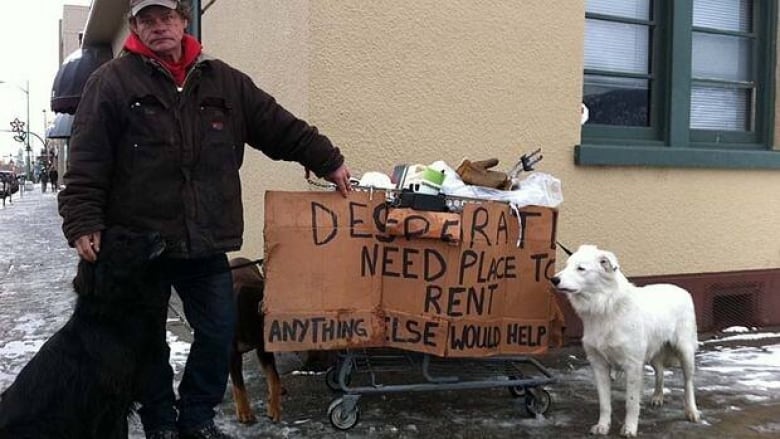Homelessness key to public safety concerns for Okanagan mayoral candidates
Tom Dyas wants shelters out of downtown Kelowna; Jason Cox wants affordable housing in Penticton

Providing housing and shelter for homeless people would have a positive knock-on effect on crime and drug abuse in urban centres, say two Okanagan mayoral hopefuls — but whether that accommodation should exist in downtown areas remains a matter of debate.
Homelessness is a key issue for mayoral candidates across B.C. in the run-up to the municipal elections on Oct. 20.
In Kelowna, homelessness and public safety have been consistent talking points throughout the campaign of candidate Tom Dyas.
As former president of the Chamber of Commerce, Dyas has led a lobby to move homeless shelters out of the downtown core.
Dyas says the homeless, those addicted to drugs, and criminals are in the same "coliseum" in the downtown area, and this creates safety concerns for local residents and homeless people themselves.
"There are individuals that prey upon those that suffer from addiction and mental illness, therefore escalating crime and vandalism within our community," Dyas told Daybreak South host Chris Walker.
Public safety concerns
A survey by the city's Chamber of Commerce showed that around 80 per cent of its members who own businesses downtown are concerned about safety and security.
"Our downtown has become unsafe for residents and business owners and tourists," Dyas maintains.
He says moving shelters out of the area would give those who are homeless due to mental illness and poverty the opportunity to move forward with their lives.
However, a survey by the City of Kelowna last year found 80 per cent of residents felt the downtown core was safe.
And Dyas's views have drawn criticism from local advocates such as Dr. Jim Ketch, who has worked with the homeless population for decades and is the lead physician at the Outreach Urban Health Centre in downtown Kelowna.
Ketch says that removing homeless shelters from downtown is not the answer to the city's concerns. Having those services there is familiar and comforting to those who are in need of help, he says.
"Let's deal with their mental health, their addiction, the traumas that they've had … and from there we can integrate them back into society," Ketch told Walker.
Ketch says that part of that integration effort is making affordable housing available to the homeless population. Then they will begin to move out of the downtown core, he says.
'Wolves ... on the street'
In Penticton, businessman Jason Cox has also expressed concern over public safety and homelessness during his campaign to become mayor.
Like Dyas, Cox says the issues of homelessness, mental health and crime often get conflated and overlap.
In Penticton, people that are homeless and have mental health issues are being robbed by violent criminals, he says.
"That's where we get the situation of people sleeping on park benches, or on sidewalks or under bushes during the day. Because they spent the whole night up, protecting themselves and their property from these wolves that are on the street," Cox told the CBC.
Cox says the City of Penticton needs to find ways to provide reliable shelter for the homeless.
"Once you have a roof over your head and a permanent address, you can do things like have a regular doctor and have regular access to services that can put you on the road back to being a member of the community," says Cox.

In Penticton, 60 per cent of calls to the RCMP are not criminal in nature, according to Penticton RCMP superintendent Ted De Jager. They are often complaints about the homeless population.
De Jager says police can put a stop to public drinking and drug use in the moment, but they cannot address root causes.
"At the end of the day, police and enforcement will not stop homelessness," De Jager told Walker.
According to De Jager, the number of complaints about the homeless to the RCMP could drop drastically if more accessible housing was available. Then, police could begin to separate criminal behaviour from poverty.
Listen to RCMP Supt. Ted De Jager's full interview:
Listen to Dr. Jim Ketch's full interview:
With files from Daybreak South

